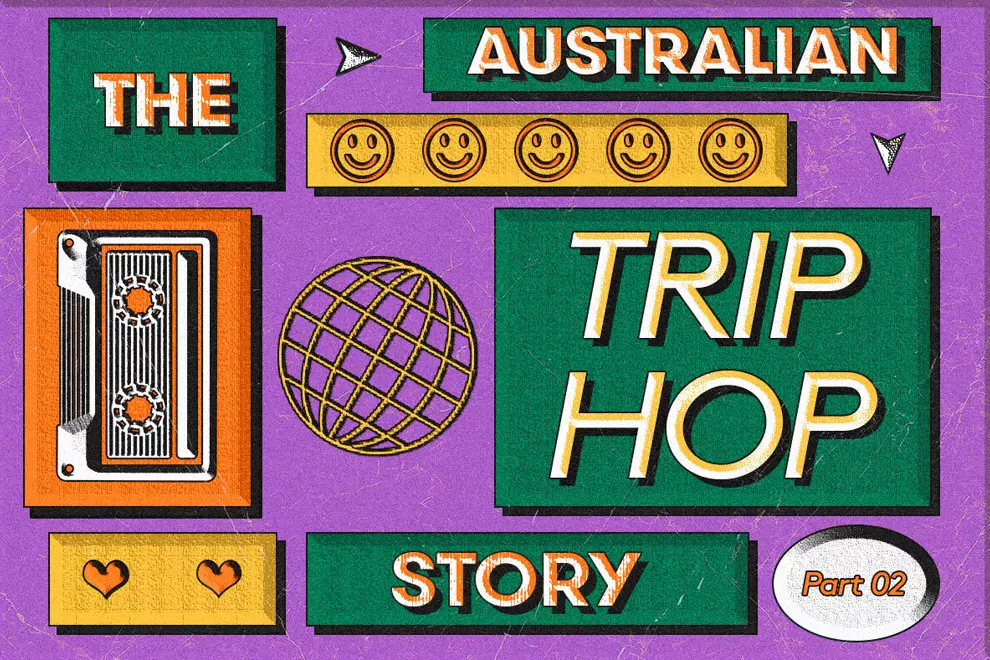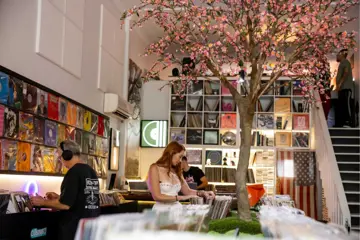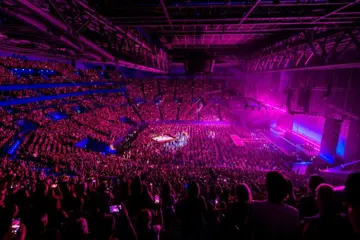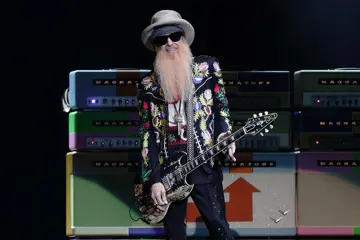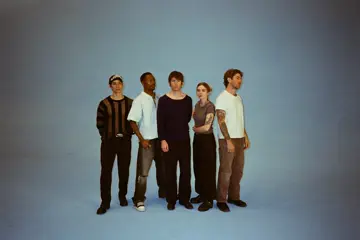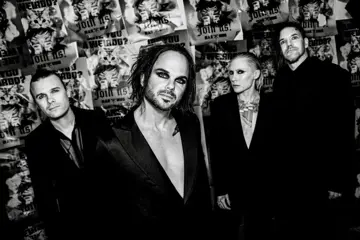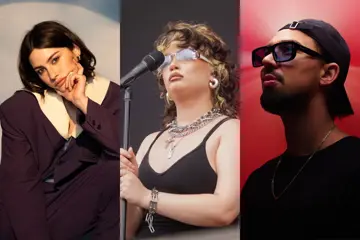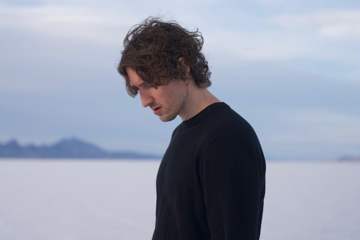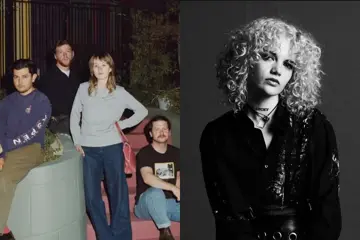Haven't read Part One yet? Check it out here first!
--------------------------------
Raised By Wolves: The Underground Renegades
Of all the One Movement Records acts, Sydney's Raised By Wolves (RBW) generated the most underground mystique. The chameleonic duo – Lioncub (Murray Creagh) and Ra The Car Crashing Bastard (Richard Austin) – had hip-hop roots, but tilted towards electronica. They inadvertently pioneered Australian trip-hop, illbient and drum 'n' bass.
As a teen in the '80s, Creagh loved funk: from Sly And The Family Stone and Parliament-Funkadelic to the Prince-elevated Minneapolis sound and Washington DC's go-go. For his 2RRR radio show Family Funktion, he programmed funk, hip-hop and even Sly And Robbie's electronic experimentations. Off-air, Creagh caught the acid jazz band Swoop live, with Austin on keyboards. "Around 1992, I ran into [Austin] again and played him some beats I'd made," Creagh recollects. "We started working together making hip-hop – we were very into Pete Rock and all the East Coast stuff of the time – with a view to producing for MCs. We formed a group called Stepchild, which was Ra and I doing the beats, and two MCs from a crew called 046 – Mobske and Sirius – doing lyrics (I wrote some lyrics, too). We did some shows and things before it wrapped up as a project. [But] people started to be interested in more specifically instrumental hip-hop, and we got a chance to release some music and do shows. We did always want to keep working with vocalists and MCs, but the instrumental stuff was a bit more of a runner for a while because it was fashionable." And so RBW evolved into a production combo, utilising Austin's acumen as an audio engineer.
Creagh's tastes became ever more expansive, leading him into the soundscape realm. "I remember liking the first album by The Orb [The Orb's Adventures Beyond The Ultraworld] and wondering if that kind of thing could work with different beats. And I remember the album Passion – Sources [comprising the music from Martin Scorsese's The Last Temptation Of Christ on Peter Gabriel's Real World Records] as a piece of the puzzle, too, thinking, 'Could I do something like this?' – by that, I meant impressionistic and heavy, but soundtracks in general." Creagh scored a friend's short film, Austin assisting with the mixing – the results "proto-RBW".
Don't miss a beat with our FREE daily newsletter
RBW advanced a sample-based instrumental hip-hop template that was closer to the illbient from the US – and chiefly DJ Shadow's formative output. "Shadow wasn't an influence on the music, but I think he and the general Mo' Wax thing created the audience for it," Creagh notes. "The [Boston/New York] label Av8 Records was an influence: some of the tracks we released had these looping hip-hop vocal samples, which was kind of the Av8 vibe, but they were more like 'DJ tools'."
RBW were connected to the Sydney hip-hop underground. Creagh had befriended Slingshot promoter Trent Roden and, together, they hosted the Spooky Tricks hip-hop nights and published a fanzine, Eye Of The Needle. However, Creagh and Austin also fell into the avant-garde electronic subculture fostered by the Clan Analogue label collective. "I was introduced to Clan Analogue through my friend Kazumichi Grime a few years before RBW started releasing things," Creagh says. "I played congas and timbales and would accompany DJs at a night Clan Analogue did for a while. The hip-hop group we had, Stepchild, performed at a Clan Analogue event once, too. Stepchild was like a Fu-Schnickens-type of thing, if that gives some indication of how eclectic that event was, with ambient electronic acts and so forth." But not everyone welcomed this cultural crossover, Creagh adds. "I do remember some of the other hip-hop kids taking a negative view of that!"
RBW contributed to One Movement's Undertones 3 plus the two Home Brews compilations – their trademark track, the epic and sinister Odessa X, appearing on the former, along with the pre-dubstep Someone, Somewhere. "Interestingly, before Undertones 3 came out, Mo' Wax did ask to license Odessa X for their Headz 2 compilation, but we'd already licensed it to One Movement – [so] that was encouraging, if maybe a bit of a missed opportunity for us."
RBW likewise supplied the beat for the Lebanese-Australian rapper Sleek The Elite's Microphone Bangin' on Home Brewz Vol II. "He was a great presence about the town and a super-nice guy – usually working with our friend DJ Soup, who produced the rest of his album [1997's Sleekism]."
RBW established a decent profile on the live circuit. They were often joined by MCs and fellow musicians – including members of Metabass'n'Breath, with Nick Toth their DJ. "It was an unconventional show, I suppose – sort of halfway between a typical hip-hop show and Autechre or something," Creagh ponders. "It didn't work in some venues [but], in other contexts, it was sometimes really great. We would just try things." RBW gigged at the infamous Freaky Loops parties.
At least initially, Creagh felt that the wider public wasn't ready for Australian hip-hop – a scenario compounded by the fact that homegrown MCs were yet to find an authentic voice. Listeners were more responsive to instrumental music, although it was "unplayable on radio," Creagh rues. "From my perspective, it was a bit restrictive and constrained when I first started doing things."
Nonetheless, there were surprises. "An early highlight was an impromptu show we did with DJ Shadow. We'd done the support at The Metro for Shadow and James Lavelle [on 1995's Mo' Wax Tour] a week or so before and I think, because of the venue, it was maybe a bit flat as a night. At the end of the tour, Shadow wanted to do something else. Clan Analogue kindly lent Trent and I their venue with no notice and we played with Baba from Metabass as guest MC/hypeman and DJ Jay scratching, and then Shadow played and local MCs freestyled – and it was a great night." The overall scene soon shifted. "The audience became more open as things developed."
Unlike Wicked Beat Sound System, RBW didn't release an album. "I absolutely wanted to," Creagh admits. "We got offered the same deal as WBSS, but passed on it. Considering we were doing seven-minute long instrumentals where the first two minutes is just drums and a blip, I'm not sure why we thought we should be passing on offers! We thought we should do everything ourselves – make a more uncompromising album and license it to a label in the UK or US directly, but we were nowhere near having our ducks in a row, really." Creagh subsequently launched a solo vehicle, Rekindle, cutting drum 'n' bass (and, eventually, synth-pop). His tune Kanday Weapons featured on One Movement's Force One: A Compilation Of Australian Drum & Bass.
Even now, the RBW mode of trip-hop sounds current, but their music captured the decade's flux and fluidity. "Thinking back to this period now, it seems to me to have been a live scene more than anything – which is odd, given the genres of music [were studio-oriented]," Creagh reflects. "Technology dictates so much and things were changing. The '80s paradigm was definitely that you make demos at home and then go to a 'real studio' – when someone gives you the money to do it. This period we're discussing is that idea fading, but the emerging approach still being quite nascent. Making hip-hop in Sydney then was being DIY, but aspiring to some quite lofty production values. I think this kind of 'abstract' instrumental hip-hop, and especially drum 'n' bass, was a way of changing the frame of reference; what one could do with the resources you had." RBW were able to diversify, exploring their cinematic influences and, later for Creagh as Rekindle, jungle and New Wave.
Creagh is now living in the UK. He's contemplating a Lost Tapes-style comp for Rekindle – and possibly another for RBW. But Creagh continues to record music. "I've been working on a new Rekindle album for a while. It's a bit of a forever war, but it's almost there... I might just need one more pandemic to finish it!"
Moonrock: The Illbient Pioneers
Katalyst (aka Ashley Anderson) directly linked the Sydney and Bristol music scenes when he partnered with Portishead's Geoff Barrow in the 2000s. But, before then, Anderson progressed Australian trip-hop as half of Moonrock with the late Illpickl (Michael Wright), hybridising breakbeats, electronica and soul.
At the beginning of the '90s, Australia did not have a recognisable soul movement – and Black music idioms such as R&B and hip-hop were largely popular with youth from cultural backgrounds other than Anglo-Celtic Australian. Nonetheless, the decade's hip-hop boom revolutionised that, as did increased Internet connectivity and globalisation.
The freshest hip-hop act on One Movement Records' Undertones Vol 1 was Urban Poets, an early incarnation of the legendary Sydney crew Easybass – the MC/beatmaker Illpickl among its members. Urban Poets' two jazz-hop contributions, Soup and Phat Sax, had production from Melbourne's DJ Ransom.
Rebranding themselves as Easybass, the collective operated out of a studio above The Lounge Room, an underground hip-hop store in Sydney – which, Anderson recalls, would become a "hub for the movement." In fact, Easybass recorded their seminal mixtape, Space Program 1996, here. And it was in this complex where Anderson, an aspiring hip-hop DJ, bonded with Illpickl. "For me getting into production, I guess that was the inspiration – given I met Mike, Illpickl, through that whole crew and scene and just basically went on to buy a sampler and teach myself how to use it." He and Illpickl formed Moonrock, making sample-led instrumental hip-hop – or illbient. "We didn't know a lot of rappers necessarily," Anderson explains. "There weren't a lot of rappers around." Coincidentally, by not engaging vocalists, Moonrock were afforded greater scope to experiment sonically.
Moonrock's Ill Street Blues – a DJ Shadow-esque, soundscapey, downtempo classic – surfaced on 1997's Home Brewz Vol II. The cult Ibiza DJ José Padilla subsequently included Ill Street Blues (as well as another Australian track, Endorphin's Satie 1) on the latest instalment of his fashionable chill-out compilation series, Café Del Mar (Volumen Seis). "It got played in Ibiza by an English DJ who was friends with José," Anderson says. "He was in the café and asked who made the track and [the DJ] was like, 'These young producers from Sydney' and so the track was then licensed to Café Del Mar... – which changed the course of my musical career in a lot of ways. It just enabled me to do a lot more stuff that maybe I wouldn't have been able to do if I hadn't had that break, really."
In 1998 Moonrock presented a self-titled album via Creative Vibes, with Easybass DJ Leeroy Brown providing cuts. Yet Anderson undertook negligible promotion. "I was pretty green and naive as to how the industry worked," he admits. "We just sort of put the record out. I actually travelled for a year; just before we put the record out, I left and did a trip for a year. So I didn't really see or get to gauge a lot how it was received locally. But there was definitely a much smaller market for that style of music at that time. It was quite a niche release." After Moonrock, Illpickl inked a solo deal with Warner Music. Alas, he passed unexpectedly in 2001, his LP Rated G issued posthumously.

Back in Sydney, Anderson serendipitously teamed with a Bristol trip-hop innovator – Barrow, a validation in itself. "We just met literally through a mutual friend when [Barrow] came out here on holidays – 'cause he'd done a world tour and Portishead were taking a break," Anderson relates. "He really liked Australia. [Portishead DJ] Andy Smith's cousin is an Australian guy and so [Barrow] had that person he knew on the ground here. Then, just through hanging out, he met a friend of mine and started seeing her for a little while. She introduced us and we became friends because we had a lot in common."
In 2001 the pals set up Invada Records with Sydney engineer Fraser Stuart – the label airing Anderson's inaugural project as Katalyst, Manipulating Agent, the next year (he marked the album's 20th anniversary in May). By now, Anderson was leaning into the emerging nu-skool breaks. Still, Australian music industry-types were unsure where to place him. "Even when I did the first Katalyst record, I was nominated as 'Best Dance Release' [at the ARIAs]," Anderson says. "We didn't even have an 'urban' category at that time, let alone breaking 'urban' up into R&B and hip-hop and different categories within the urban banner. A lot of that industry's driven by numbers in the way that they categorise things, and those genres just weren't the genres that sold in Australia. So there was that challenge."
Meanwhile, Barrow, who produces as Fuzzface, invited Anderson to Bristol to work on the New Yorker Stephanie McKay's debut, McKay, moving his career in a hip-hop soul direction. Anderson then guided Universal Music's Melbourne protégé Eran James – Ruel's precursor – as he laid down a covers album, Reviewing The Situation, with the renowned Hungarian-Australian musician Jackie Orszáczky's band (Orszáczky being featured on Undertones Vol 2). "They were trying to copy the Joss Stone record [The Soul Sessions] – that was the blueprint," Anderson quips.
Assuming the new handle Supa K, Anderson eventually started a production supergroup, Quakers, with Barrow and Invada Studios engineer Stuart "7STU7" Matthews. In 2012 they dropped an eponymous album on Peanut Butter Wolf's Californian Stones Throw Records, recently following with the DJ Premier co-signed II – The Next Wave; Sampa The Great blessing the boom-bap single Approach With Caution ("that was done well before she became a household name," Anderson reveals). Quakers are discussing a third LP. "Geoff didn't write much music on [II – The Next Wave], but he's been pretty inspired by the reaction and [he's] keen to be more involved in the next one possibly."
Anderson has established a multi-faceted profile. Aside from Quakers, he's also released music with Steve Spacek as Space Invadas – homegrown soul. Anderson notably produced Guilty Simpson's Detroit's Son, again for Stones Throw, and has cut material with Western Sydney's Def Wish Cast. Today he is no longer based in Sydney, having transplanted to Mullumbimby, near Byron Bay.
Reflecting on Sydney's trip-hop era, Anderson reckons he belonged to "a broader community," rather than a specific scene, because its individuals didn't automatically socialise, perform together, or share bills. Regardless, the subculture inevitably fragmented as the artists evolved and expanded. "There was definitely a lot of community within sections of the genre, but not necessarily as a genre as a whole, I think – in the sense there's always some sort of competition."
Robyn Loau: The Pop Auteur
The Australian trip-hop wave swept through the pop sphere. Rani, who led Hatman's I Have A Dream, signed to Virgin Records – 1997's hit Always On My Mind earning her an ARIA nomination for 'Best New Talent'. And the dance diva Lisa Maxwell – who'd positioned herself as R&B with a buzz cover of Sister Sledge's Thinking Of You – veered into trip-hop on her Sony debut, Wish. But Sydney's Robyn Loau was the innovative disrupter, collaborating with international electronic producers on her 1998 album, Malaria. "I did find that that crowd embraced me," Loau says. "It was just much more fun to play with those guys in that scene than the mainstream music scene… I felt right at home there."
At the start of the '90s, Loau joined the group Girlfriend – an Antipodean prototype for the Spice Girls with a "squeaky-clean, manufactured image," trademarking flower hats, colourful attire, and blithe tween bops. The young singer auditioned for the ensemble – her first key music industry gig. As a Pacific Islander born in New Zealand but raised in Sydney's multicultural Western suburbs, Loau recognised "a great opportunity" for representation. The quintet released 1992's Make It Come True, with the chart-topping Take It From Me, via RCA. They made inroads into the UK and Japan.
But, following Girlfriend's second album, It's Up To You, Loau quit. Coming of age, she realised that a prescribed path wasn't for her. "I had outgrown my role as part of a family-friendly product and was eager to shed that image and start creating my own material. Even though I was very grateful for that opportunity to create a profile, I just felt really stifled by the experience. The whole thing was so scripted and overly-produced and it just wasn't as enjoyable or half as profitable as I'd imagined." Loau saw an exploitative aspect to pop. "It was a real eyeopener in terms of how repressed females are in a male-dominated industry."
Post-Girlfriend, Loau "rebelled" – her desire not so much as to reinvent herself, but to develop authentic art. She'd already tapped into the UK's new electronic genres: trip-hop, jungle and drum 'n' bass. Indeed, Loau was listening to Tricky and the pioneering nu-skool breaks DJ/producer FreQ Nasty. "I can't tell you why, but I felt right at home with this dark, industrial, synthetic, programmed beat-based music – the complete polar opposite of where I'd come from," she enthuses. "I really didn't see myself as bubblegum pop. I was more excited and attracted to the darker, edgier side of pop and synthetic beats." Still, while determined to establish her own musical identity, Loau struggled. "Many people in the Australian music industry were quick to dismiss me as bubblegum, kiddy dance-pop; just as a product of that after the ridiculous success of Girlfriend in the early '90s."
Loau fronted Siva Pacifica – a project combining traditional Pasifika music with electronic soundscapes initiated by the transient English producer Anthony Copping, who'd served as Girlfriend's engineer. Siva Pacifica allowed Loau to reconnect with her Samoan heritage – and to claim creative input. Their album was especially popular in Europe. "This was just a great opportunity for me to get back to my Polynesian roots, because I moved to Australia when I was about seven – and it was white Australia at that time. I grew up in the Western suburbs of Sydney and there weren't very many Islanders around at that stage."
In the meantime, PolyGram's Adam Holt offered Loau a deal. "He gave me free rein to do my first solo album and so I headed over to the UK," she says. "It was easier for me to collaborate with songwriters and producers and mixers in the UK, because they had no preconceived ideas or parameters as far as where to go stylistically or who the demographic was. So, in my head, I was making a radical deviation from where I had just been."
There was some expectation that Loau recast herself as an R&B artist, genres oft-racialised, but not from Holt. "I really felt like, because of the colour of my skin, they assumed that I would be this R&B/soul singer – not that I don't appreciate that, but it just wasn't who I am. Obviously, I can sing it, but I don't belt; I don't have that thick tone and huge chest range to belt. And I know who I am. I like my tone. So I just felt, 'No, I'm actually going to go my own way.'"
Loau also worked with Copping on the subversively named Malaria, further exploring Pasifika influences. He'd link her to the likes of the Brit acid house DJ/producer Adamski – who had partnered with Seal early in his career, helming 1990's mega-hit Killer. Loau immediately bonded with Adamski. These ravers didn't care about image or the old metrics of success such as radio rotation and units sold. "We were just creating music that we were digging," Loau recalls. "I was being reckless and completely revelling in my own artistic freedom with like-minded artists – and, believe me, there was nothing bubblegum about these guys! They were these pasty white geezers with tattoos – way before tattoos became a homogenised accessory. These guys were harder and tougher, but not in a thuggish, aggressive way or a violent way. They were just thick-skinned and their survival mode was different. They just had a great attitude; a tougher, darker attitude. They were more 'Fuck you' than 'Thank you', which was perfectly in-sync with my mental state at that point."
In fact, Robyn recorded her groundbreaking 1997 solo premiere Sick With Love – somewhere between Neneh Cherry, Björk and Aaliyah – with Adamski. "I was warned about how he could be quite a handful. But, when I met him, he was just so softly-spoken and always twisting his hair – so just such a lovely guy. And [he] would address me in such a sweet way – like, 'Would you like a cup of tea, Robyn?' Just really lovely, but so adventurous; in a childish, playful sort of way. He was introducing me to different styles of music. He said, 'Robyn, I wanna play you this album by The Prodigy.' I'd kind of heard the singles, but I just loved what he was playing. He said, 'Why don't we just experiment?'"
Loau relished Adamski's intuitiveness. "He was adventurous – like, in the middle of doing a piano track, he would just start bashing and slapping on the keys. I mean, it was just great, this free energy. We didn't have the record company looking over our shoulders and looking at their watches. So it was just a great experience to have that creative freedom." They cut several songs – among them Malaria's opener, Song 4 U. "I remember us being in the studio and losing all track of time. I think we came out of the studio at one or two in the morning and it was snowing; the snow was falling on my face and I thought, 'This is just such a moment in my life that I'll never forget.'"
Sick With Love was well received in Australia – crucially securing triple j airplay. Nonetheless, on catching a snarky back announcement about the song's (inventive) vocal effects, Loau wondered if the station didn't treat her as a novelty. "It was this dark-skinned girl from a pop background trying something completely new," she rues. "It was just interesting to see how people responded to that. Some people were like, 'Yay!' Some people were like, 'Nah, go back to being that one-trick-pony please.'"
Loau encountered more than pushback. Alas, she was soon embroiled in a label merger, PolyGram subsumed into the Universal Music Group – ironically the same year that One Movement Records folded. Although Malaria had been promoted with two additional singles – notably the anthemic Love Addiction (the jungle remix featuring EMF frontman James Atkin) – and serviced to reviewers, it was canned and Loau let go. "[PolyGram's] new owners pretty much got rid of all the furniture – and I was included in that. That was it for my album, just before it was about to be released. So that was a huge blow for me. I had put all my eggs in this one basket, and this one album, and I was ready to show the world, 'Okay, this is actually who I am and what I do.' Unfortunately, the music business cleared that in one fell swoop."
Loau resolved to change her approach to music, no longer relying on the vagaries of majors. "It was heartbreaking for me," she sighs. "I was so disillusioned and, to be honest, a little bit depressed. So I took myself overseas for a while, 'cause I enjoyed travelling and meeting people that loved me for just being me, rather than signed to a label. That really helped my mental health and helped me see what I needed to do next – which was, 'Okay, I've got this talent and, yeah, they might have the album shelved, but I can do more.' And that's exactly what I did. I thought, 'I'm actually a great performer, and I love singing,' so I just became a hired gun after that."
These days Loau – who branched out into acting in the '90s – has multiple endeavours. She is a creative therapist with her own company, Creative – Play – Express. Loau then gigs as a guest and backing vocalist, while staging cabaret shows. She's recently performed in the touring concerts We Can Be Heroes: The Music Of Bowie Orchestrated (with The Church's Steve Kilbey and others) and the John Lennon tribute 50 Years Of Imagine (with ARIA Hall Of Famer Russell Morris, Little River Band's Glenn Shorrock and '90s radio fave Wendy Matthews). With Take It From Me turning 30 in April (and Make It Come True in September), Loau has considered a Girlfriend reunion: "There is talk." Yet the logistics are difficult, she says.
In later times, Loau has also had exchanges with the local electronic dance music overground. In 2007 the star released the single She Devil and, two years on, unveiled her second album, Only Human. Now confidently self-producing, Loau worked alongside Melbourne's Josh Abrahams, who previously remixed Sick With Love and blew up with his own drum 'n' bass banger, Addicted To Bass, featuring Amiel.
In 2008, Loau finally issued the singularly trip-hop Malaria under the symbolic title Malaria: The Lost Album, feeling assuaged. "I had people doing the deals to get it back out into the open," she explains. "I really was just so shellshocked by the [Universal] experience that I hadn't listened to it for quite a number of years. But, when I sat down and revisited it, it was beautiful. It was a beautiful experience, because it was like opening a photo album and remembering what it felt like to be in the studio: the smell in the studio, the sound of the pop shield in front of the microphone, the weight of the headphones… Stuff like that came back to me. It was great. It's almost like revisiting your childhood. The great things come to light and, of course, the shitty things also. However, I chose to put that aside and be proud of myself; more than anything, just proud of what I had achieved."

